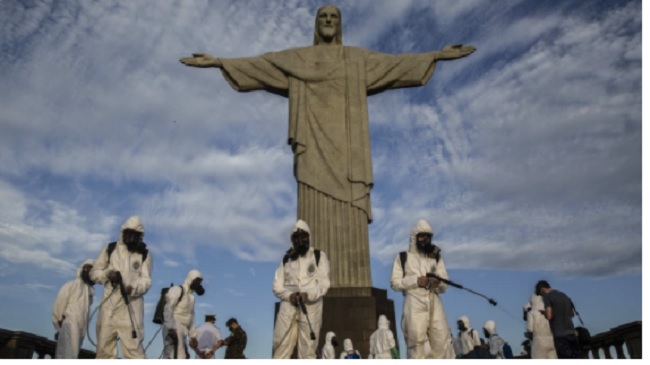RIO DE JANEIRO — COVID-19 has already left a trail of death and despair in Brazil, one of the worst in the world. Now, a year into the pandemic, the country is setting another wrenching record.
No other nation that experienced such a major outbreak is still grappling with record-setting death tolls and a health care system on the brink of collapse. Many other hard-hit nations are, instead, taking tentative steps toward a semblance of normalcy.
But Brazil is battling a more contagious variant that has trampled one major city and is spreading to others, even as Brazilians toss away precautionary measures that could keep them safe.
Sign up for The Morning newsletter from the New York Times
On Tuesday, Brazil recorded more than 1,700 COVID-19 deaths, the highest single-day toll of the pandemic.
“The acceleration of the epidemic in various states is leading to the collapse of their public and private hospital systems, which may soon become the case in every region of Brazil,” the national association of health secretaries said in a statement. “Sadly, the anemic rollout of vaccines and the slow pace at which they’re becoming available still does not suggest that this scenario will be reversed in the short term.”
And the news just got worse for Brazil — and possibly the world.
Preliminary studies suggest that the variant that swept through the city of Manaus is not only more contagious, but it also appears able to infect some people who have already recovered from other versions of the virus. And the variant has slipped Brazil’s borders, showing up in two dozen other countries and in small numbers in the United States.
Although trials of a number of vaccines indicate they can protect against severe illness even when they do not prevent infection with the variant, most of the world has not been inoculated. That means even people who had recovered and thought they were safe for now might still be at risk and that world leaders might, once again, be lifting restrictions too soon.
“You need vaccines to get in the way of these things,” said William Hanage, a public health researcher at Harvard T.H. Chan School of Public Health, speaking of variants that might cause reinfections. “The immunity you get with your cemeteries running out of room, even that will not be enough to protect you.”
That danger of new variants has not been lost on scientists around the world. Rochelle Walensky, director of the U.S. Centers for Disease Control and Prevention, pleaded with Americans this week not to let their guards down. “Please hear me clearly,” she said. “At this level of cases with variants spreading, we stand to completely lose the hard-earned ground we’ve gained.”
Brazilians hoped they had seen the worst of the outbreak last year. Manaus, capital of the northern state of Amazonas, was hit so hard in April and May that scientists wondered if the city might have reached herd immunity.
But then in September, cases in the state began rising again, perplexing health officials. An attempt by Amazonas Gov. Wilson Lima to impose a new quarantine ahead of the Christmas holiday was met with fierce resistance by business owners and prominent politicians close to President Jair Bolsonaro.
By January, scientists had discovered that a new variant, which became known as P.1, had become dominant in the state. Within weeks, its danger became clear as hospitals in the city ran out of oxygen amid a crush of patients, leading scores to suffocate to death.
Dr. Antonio Souza remains haunted by the horrified faces of his colleagues and relatives of patients when it became clear his Manaus hospital’s oxygen supply had been exhausted. He thinks about the patient he sedated, to spare her an agonizing death, when the oxygen ran out at another clinic.
“Nobody should ever have to make that decision,” he said. “It’s too terrible.”
Maria Glaudimar, a nurse in Manaus, said she felt trapped in a nightmare early this year with no end in sight. At work, patients and their relatives pleaded for oxygen, and all the intensive care beds were full. At home, her son caught tuberculosis after contracting COVID-19, and her husband shed 22 pounds as he fought the virus.
“No one was prepared for this,” Glaudimar said. “It was a horror film.”
Since then, the coronavirus crisis has eased somewhat in Amazonas but worsened in most of Brazil.
Scientists have scrambled to learn more about the variant and to track its spread across the country. But limited resources for testing have kept them behind the curve as they try to determine what role it is playing.



